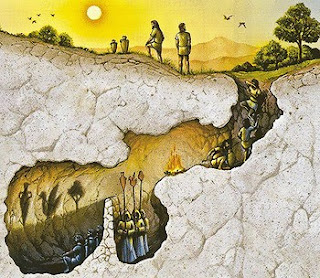There’s a story they tell, when the taste for all other stories has run dry. When the tongue tires of weaving tales of sages and singing songs of heroes; when the heart feels cold and afraid, and nothing seems sufficient to chase away the dark. On days like those, when they’ve exhausted all other options, they tell the story of the pit.
And the prince who fell into it.
The pit is dark and deep, and the chances of the prince ever climbing out are slim-to-none. For all intents and purposes, this tale is over.
But not for him. His story doesn’t end when he falls into the pit.
That’s when it begins.
He falls long; falls hard. Bangs his head, scrapes his skin, sprains some bones. To a prince who has only ever known the soft comforts of a palace, the pain is blinding. He comes to a stop eventually, though how far away from the bottom is anyone’s guess. This pit is as wide as it is deep, filled with ledges and alcoves branching off into darkness. It seems endless—an impossible distance to climb and an impossible distance more to fall.
But the prince is indignant. He is a prince, after all. A prince does not belong in a pit. He belongs outside, free and proud and reunited with his father. So he picks himself up, dusts himself off, and sets off to find a way out.
It’s on one of his explorations that he finds the rope. There’s not much to it, really—just a thin, long rope, rising out of the pit into the world beyond. And yet, it’s somehow the most beautiful thing he’s ever seen. He runs to it, grasps it with both hands. At last, he has a way out.
But, as he soon discovers, leaving this pit is not so simple. He’s a prince, after all—his body isn’t made for rope climbing. His hands bleed, his muscles ache, his grip slips again and again. He forces himself to keep climbing, to fight through the exhaustion and the sweat and the pain, but for every step he gains he seems to fall two more, the excitement that once fueled him long since lost.
Yet still he climbs, compelled by a drive he cannot comprehend. A need to ascend. To return.
Until, one day, his grip fails.
And he falls.
He falls hard, hits a rocky ledge with a groan. He hasn’t fallen in a long time—not since he first fell into the pit. The pain is the first to hit: blinding, flooding his eyes with tears and spasming through his muscles. Then comes the anger. He surges to his feet, bends over and screams. It's not fair! He’s a prince. What business does a prince have in a pit?
So he sulks for a while: kicks at rocks, explores some caves, not accomplishing anything of value. He knows he’s procrastinating. He should be climbing the rope. But he’s afraid. He’s never been afraid before, but now he’s terrified. What if he tries again, and fails? What if he climbs and falls even further?
But in the end, even his fear is not enough to stop him. He needs to climb, more than he needs to breathe or eat or sleep. He walks back to the rope, gazes up, takes a deep breath.
And climbs.
It’s different this time—he's not as enthusiastic as he once was, but he’s not as naïve, either. He remembers the parts where he struggled last time; remembers how he pushed himself too hard and gave up. He tries a more measured approach, taking longer breaks, pausing to eat and drink.
But climbing is hard, especially when you’re a prince. His grip slips one day, and he falls a few feet—catching himself on a nearby ledge at the last minute. He jumps to his feet and dashes for the rope, but in his fervor he forgets his earlier measured approach. He scrambles upwards, desperately trying to regain the ground he lost, but his muscles are sore and his hands slick with sweat.
He falls, and falls hard.
What follows next is as familiar as it is soul-crushing. The anger settles in; the despair, the fear. He rages at his situation—resolves to just give up. And finds that he cannot. He attempts the climb, again and again and again, sometimes climbing further, other times barely making it more than a few feet.
In the end, he always falls.
Until one time, he falls harder and farther than ever before. Far enough that, for a moment, he feels suspended in space, wondering if he’ll finally reach the bottom of this pit.
After he falls, after he recovers, after he gets back to his feet, he’s consumed by a rage he’s never felt before. He lunges for the rope, grabbing a sharp rock on the way. And, with a roar, he starts cutting. He slashes at that rope, again and again and again, until the rope is in shreds around him, as ruined as his chances of ever escaping.
Then he slumps back, satisfaction and pain and grief warring inside him, and, for the first time, accepts his fate.
He may have once been a prince. He may once have lived free. But no longer.
He’s never leaving this pit.
There’s not much to say about the days that follow. The once-prince explores the area he’s fallen to, discovering that there are endless chambers and countless rooms to explore. They’re filled with curiosities, marvels and wonders of their own, but they mean nothing to him. He knew the outside world once—what interest do the secrets of a pit hold for him?
Time passes in a meaningless drudge. Another cave explored, another cavern passed through. And slowly, as he walks, the need he thought he’d buried kindles again.
He is a prince. He doesn’t belong in this pit.
He needs to find a way out.
And so he returns to the place he fell, scans the floor for the tattered remnants of his rope. He finds a piece of the cord, a second, a third, starts tying them together. It’s hard work—searching for the scraps, tying them together, searching again. He tries to stay excited through the process, but there are times he can’t keep the despair at bay.
And, during one of his darker moments, as he scans the cave floor dejectedly for the next scrap of rope, a thought occurs to him:
It’s dark in this pit.
How is he finding the scraps of rope?
He lifts his head up, slowly, his neck and spine creaking in protest—has it been so long, he wonders, since I last looked up? He's not certain himself what he expects to see. It’s night out there, the dark thick and absolute, and for a moment it’s hard to tell where the pit ends and the world outside begins.
And then he sees it: a flicker of motion, so small, so subtle, he could almost believe he’d imagined it.
There’s a flashlight at the lip of the cave, shining all the way down to where he stands.
And though he cannot see anything beyond that flashlight, he knows with absolute certainty Who’s holding it.
He stares up, mouth dry, the pit around him forgotten. His mouth feels suddenly full of questions, and it’s all he can do not to scream them out. “Father!” he yearns to scream, “Why have you abandoned me? When will you take me back?”
But he swallows those screams, because he knows that at this distance any words would get lost long before they reach the end of the pit. And because they’re not the question he really wants to ask. The question that eats at him; the question that keeps his back bent and his head fixed down.
So instead, he stares up at his unseen Father and silently wills Him to hear the question he can’t hold back any longer.
Why? He asks silently, a single tear slipping from his eye. Why haven’t You left? Why do You still hold out hope for me? Whatever it is You want from me, I’ve failed, again and again and again. I turned my back on You. I cut the only rope that still connected us. What do You see in me that I don’t?
And it’s strange, but even though he doesn’t utter a single word, the question seems to hang in the air between them, somehow tangible, somehow real.
There is a moment of silence; two. And then the flashlight moves, very slightly, to the side.
And turning, the prince sees where it’s shining.
On the next scrap of rope.
He studies it for a moment, lets a wry smile quirk his lips.
Then he reaches down, picks up that scrap, and ties.

The following spring. After four months of darkness, the Arctic begins to thaw. And the caterpillar – rises from the dead. By the time the first shoots of willow appear in the early spring, the woolly bear is already eating. But no matter how fast the woolly bear eats, it will not have time to gather enough food this year, either, and the cold closes in once again.
Year after year, the caterpillar slows down in the autumn and then freezes solid. But eventually a very special spring arrives. This one will be its last. It’s now 14 years old – the world’s oldest caterpillar. Its remaining days now become frantic. It starts to weave a silk cocoon. Inside, its body is metamorphosing into one that can fly and search, abilities that will be crucial in the days ahead.It’s waited over a decade for this spring and now, its time is near. All across the Arctic, moths are emerging. After completing their 14-year preparation, they now have just a few days to find a partner and mate.No life illustrates more vividly the shortness of the Arctic spring or the struggle to survive in this most seasonal of places." – Borrowed fromThe Frozen Planet, written by David Attenborough I learn a lot about the way He is by looking at what He
made. It’s like looking at a painting and getting a feeling about the artist.
I learn a lot about the way He is by looking at what He
made. It’s like looking at a painting and getting a feeling about the artist. 













.jpg)
